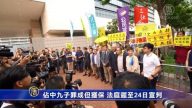【新唐人2014年10月23日讯】香港占中行动第24天,港府终于愿意与抗议者对话。有香港立法会议员认为,两个小时的对话过程,政府没有正面回应如何解决当前危机,只是拖延时间的“虚招”,很难让学生接受,更无法成为请他们回家的理由。
学联和香港政府在10月21号晚上举行“对话”。对话结束后,虽然港府代表形容会面相当不错,但学生代表们却相当失望。
学联秘书长周永康:“政府他今天有一些似是而非的方案审理出来,但是里面你可以说他是苍白无力。因为你不知道他审制的内容是什么,无公布过。”
两个小时的会议当中,学联提出修改基本法,落实公民提名,这也是占中行动的主要诉求之一。但港府方面不断强调公民提名违法,以及基本法不能随意修改。
那么,学生提出的公民提名有何重要性?香港立法会议员何俊仁表示,有两个重点。
香港立法会议员何俊仁:“第一,能够确定这个提名也是公开平等,第二,就是要保证中央政府和其他人,是不能操控提名程序,更不能产生筛选的效果,现在的人大常委确切是要中央产生操控提名筛选的后果,公民提名就是要针对这一点。”
在铜锣湾集会现场观看学联对话直播的抗议者,对政府高官的发言感到不满,但群众表现仍然克制。
香港立法会议员、香港民主党主席刘慧卿:“看见学生的表现,非常之好,他们都非常有理想,非常有能力,所以我觉得特区政府一定要让中央政府提出香港人的要求,希望香港能尽快的普选。”
学联秘书长周永康在发言时表示,由9月22号学联发起罢课至今,将近1个月,1.3万名学生罢课,数十万人上街公民抗命,因抗争吃催泪弹、警棍,导致头破血流,其实是迫于无奈。
周永康还说,他们的诉求很简单,就是“公民提名”,废除钦点及功能组别。希望政府及官员有政治魄力,令港人诉求可以纳入政府的政改方案。
香港立法会议员,也是民主党主席的刘慧卿表示,功能组别是香港真普选的最大问题。
刘慧卿:“功能组别存在很多年,也是香港现在面对很多困难的原因,因为它不能代表香港人,它只是代表一小群专业人士,它是不民主的选举方法,民间很多人都要求废除功能组别,所以这个也是很多香港人多年来的心愿。”
香港政府希望成立由多方组成的政改讨论平台,对此,立法会议员梁家杰表示怀疑。
香港立法会议员梁家杰:“那么这个多方平台,话说在前头,就是不能改变2017选举的安排,所以对于希望2017可以真的自己做老板的香港人,就没有吸引力,还有这个平台所谓的多方,是哪几方?怎么去组成呢?会达到真普选吗?它是发挥什么样的作用?或扮演什么角色?这一切都没有说。”
港府代表还说,港府愿意向北京提交报告, 讲述近期香港情况和市民诉求。
梁家杰:“这个报告内容是怎么写?这完全没有交代,也完全没有详实的讨论,比如梁振英说有外来的势力加入占领的运动,那么他会不会把这个外来势力也加入他这个民情报告?或者说什么颜色革命,他会不会写进去?如果写进去就无补于事。”
另一方面,香港特首梁振英日前接受媒体采访时说,如果允许普选,香港的贫穷工人阶层讲会在政治上占主导地位。
梁家杰:“我们立法会的议员听进去,就觉得不是味了,为什么你(梁振英)选举的时候,你就把自己形容为基层的救星,霸权的克星,那么现在两年下来,你就彻底的改变,简单的说,就是为了保留四大界别和功能组别,找一个借口,这个在香港也产生很大的反弹。”
最后,香港政务司司长林郑月娥要求学生领袖让示威者离去。她坚称港府不会在2017年选举前进行更多政改。香港学联领袖周永康说,除非政府改变筛选候选人的决定,否则不会要求示威者散去。
采访/秦雪 编辑/黄亿美 后制/李智远
Hong Kong Legislative Council: Empty Dialogue
After 24 days of Occupy Central, the Hong Kong government
is finally willing to talk to protesters.
The Hong Kong Legislative Council believes
that the government has ignored the current crisis
with a fake response, dragging on the issue.
It is hard to convince the students or make them go home.
After the scheduled conversation on the evening of Oct. 21,
the government claimed the meeting went well,
but the students were disappointed.
The federation secretary-general, Alex Chow: “There were
some so-called proposals by the government today,
but they are empty and powerless.
No one knows its exact content
and they did not explain what they are."
In the two hour meeting, Hong Kong Federation of Students
(the federation) proposed to the main demand
of the Occupy Central— amend Basic Law
and implement citizen nominations.
But, the government continues to emphasize that civic
nominations are illegal and Basic Law cannot
be arbitrarily changed.
Hong Kong Legislative Council Albert Ho explains
the significance of the civic nomination.
Albert Ho: “First, it ensures the nomination is open and fair;
Second, it ensures the nomination is not manipulated
by the Central government or any individual,
not even to screen the nominee.
To control and screen the nomination is exactly what
the National People’s Congress Standing Committee want
and that’s what the civic nomination is addressed to."
Watching the dialogue live at Causeway, the federation
and protesters were very disappointed at the senior
government officials’ talk, but they still showed restraint.
Hong Kong Legislative Council and Democratic Party
Chairwoman Emily Lau: “I saw the students’ responses,
they are very good, with ideals and capability.
I think the government must let the Central government
learn the demand of the people and allow universal suffrage
as soon as possible."
Alex Chow said that it is unfortunate that 13,000 students
were forced to go on strikes and hundreds of thousands
of citizens were forced to take to the streets, and protesters
suffering from tear gas, batons and injuries.
Alex Chow explained that the demand is simple—
civic nomination, abolishment of government picked
candidates and Functional Constituency.
They hope government and officials will have the courage
to adopt the demands of Hong Kong in political reform.
Emily Lau indicates the Functional Constituency is the biggest
problem in genuine universal suffrage in Hong Kong.
Emily Lau: “The functional constituency has existed
for many years.
It is the reason why Hong Kong is now faced
with a lot of difficulties.
It does not represent the general public of Hong Kong,
but a small portion of professionals.
It is not a democratic election.
Many people desire to terminate functional constituency.
It’s been the wish of many people for many years."
The Hong Kong government wants to set up
a multi-party political reform platform for discussion.
Legislative Council Alan Leong is skeptical.
Alan Leong: “The premise of the multi-party platform is that
the electoral arrangements for 2017 cannot be changed.
To those who want to be their own boss,
the platform means nothing.
What are the parties and compositions of the so-called
multi-party?
Will it enable a true universal suffrage?
What is the function or role of the platform?
None of these were mentioned."
The government representatives said that the government
is willing to submit a report to Beijing about the recent
situation in Hong Kong and the public demands.
Alan Leong: “What is the content of the report?
It has no explanation or any concrete discussion.
For instance, Leung Chun-ying said that there are external
forces mediating Occupy Central;
will he put that into the report?
What about the color revolution?
Will he write that into the report?
If he will, then the report won’t help."
Meanwhile, Leung Chun-ying told media that
if universal suffrage is allowed, the poor working class
in Hong Kong will dominate in the political arena.
Alan Leong: “To the Legislative Council Members,
his words do not sound so right.
Why is it that you would describe yourself as a grassroots
savior, nemesis of the hegemony during your election?
But, two years later, you have changed.
Simply put it, it is an excuse just to save
the four constituencies and functional constituency.
This also has a great rebound in Hong Kong."
Finally, Hong Kong Chief Secretary for Administration,
Carrie Lam, required student leaders to allow
demonstrators to leave.
She insisted that the government would not conduct
further political reform prior to the 2017 election.
Alex Chow responded that unless the government
decides to change the screening of candidates,
they would not require protesters to disperse.
Interview/QinXue Edit/Huang Yimei Post-Production/Li Zhiyuan





















